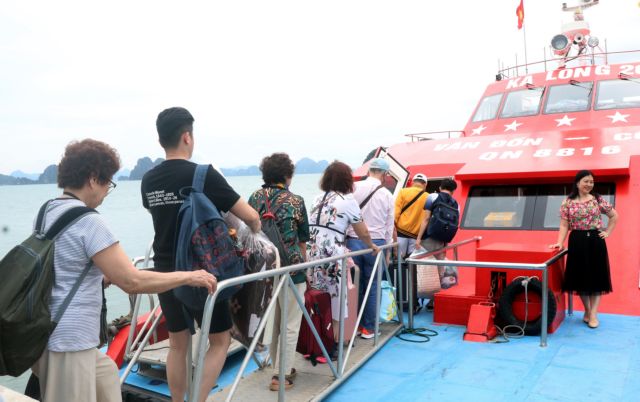 Society
Society


|
| Tourists travelling to Cô Tô Island in Quảng Ninh. Cô Tô is one of Việt Nam's most popular summer destinations, but recent tourism frauds caused authorities here to advise tourists to be vigilant in purchasing online tours. — VNA/VNS Photo Văn Đức |
HÀ NỘI — Trương Thị Hồng Hạnh and her family planned a summer vacation in Côn Đảo this year. She saw an offer for a travel combo for four people, which cost VNĐ28 million (US$1,180).
Despite having transferred the money, Hạnh's family could not board the plane to Côn Đảo, since the booking agent never returned the tickets.
Hồng Hạnh is just one of many people who fell for the scam of cheap travel combos this summer.
Hạnh added that at the end of 2022, she booked her tickets with an individual named B.T.P.N on Facebook. Through N., she booked four packages, including flight tickets and hotel rooms in Côn Đảo for two days and one night.
Many of Hạnh's friends also decided to purchase budget travel packages from N., with prices below VNĐ7 million (US$300) per package.
"At the time of purchase, I learned that N. is the administrator of a very large Facebook group about travelling in Côn Đảo, so we placed a lot of trust and transferred money to him. The total amount we transferred was in the hundreds of millions of đong," Hạnh told Nhân Dân newspaper.
However, close to the departure date, Hạnh and her friends were surprised to receive a notification from N. stating that they "could not issue tickets as per the booking schedule" and cancelled all the previous combos. What's even more concerning is that despite multiple promises, N. has not yet been able to fully refund the amount of money that the customers had transferred.
"Many others have also found themselves in a similar situation to ours with total outstanding debt for Côn Đảo combo tickets amounting to over VNĐ1 billion (US$42,245). We have now submitted a formal complaint to the Côn Đảo Police to clarify the matter," Hạnh said.
Sharing the same frustration, Lê Thị Thùy in Hà Nội recounted her experience in June when she was looking for a combo for a trip to Phú Quốc. Through social media, she got in touch with an account under the name V.T who provided consultation services.
V.T suggested a combo with flight tickets and a one-night stay at a five-star resort for the attractive price of only VNĐ3 million (US$126) per adult and VNĐ1.5 million (US$63) per child.
To gain trust, T. even sent flight and hotel reservation codes and asked Thùy to make the full payment for the combo for five adults and one child.
"After transferring VNĐ17 million (US$718) to T., we still had not received any flight confirmation near the departure date. When contacting the airline, I found out that T. had not booked any tickets for us as promised. At that point, I tried to reach out to T., but it was no longer possible," Thùy expressed her frustration.
In early June 2023, on major travel forums in Việt Nam, there was a series of information about a scam that left a group of 144 travellers heading to Phú Quốc (Kiên Giang) stranded at the airport as they discovered that there were no tickets. Interestingly, many people in this group also shared additional information about similar fraudulent cases.
According to the victims' accounts, the scammer often uses fake Facebook accounts with names and photos of other people, pretending to be employees or collaborators of travel companies. After deceiving the customers into transferring money to their accounts with promises of receiving ticket codes and hotel room codes on a certain date, the scammers disappear without a trace.
With cunning methods, after committing the fraud, the perpetrators often lock their social media accounts, and cancel contact by blocking people, making it difficult for authorities to manage, trace, and penalise them. As for the customers, they only realise they have been scammed when they lose their money or experience services that do not match the advertisements.
The Information Security Department (Ministry of Information and Communications) advise people to carefully research the information when choosing travel packages and opt for reputable companies or use reliable travel apps for booking tours, accommodations, and flight tickets. To be more assured, individuals can request to see the business licence, documents, and professional certificates of the travel company.

|
| Experts advised customers to be vigilant in booking tours on the internet. — VNA/VNS Photo Anh Đức |
Furthermore, people need to be cautious when purchasing travel packages at extremely low prices (more than 30-50 per cent cheaper than the market average), especially when the travel agency requires a deposit to secure the reservation. If possible, it is better to conduct direct payment transactions to minimise risks.
Individuals should pay attention to signs that indicate fake websites based on their domain names. Fake websites often have names similar to legitimate ones but may have additional or missing characters. Fake domain names typically use unusual extensions like .cc, .xyz, .tk, etc.
For pages and groups on social media that engage in buying, selling, and promoting travel packages, especially cheap tour packages and cheap flight tickets, people should choose those with a verified tick or those from reputable sellers whose information is well-known.
They should verify the booking information for accommodations and flight tickets to detect signs of fraud promptly or report the issue to the nearest local police authority for guidance on resolving the situation if necessary.
Phạm Đình Hà, the Director of Vietnam Unique Tours Company, stated: "Currently, the fraudsters offering cheap tours are becoming more active due to the high demand. They take advantage of the desire for cheap prices, good services, and the scarcity of accommodation at tourist destinations. These fraudsters often use images of luxury hotels, interesting tours, and beautiful landscapes to advertise in private messages within groups, making it difficult to control."
Hà advises customers before deciding to purchase a cheap tour combo, they need to verify relevant information such as business registration and the reliability of the page or account.
From a legal perspective, Trương Quốc Hòe, Director and Lawyer of Intelia Law Office, believes that buyers must be extremely vigilant against these fraudulent tricks. Customers should keep all relevant information during the process of purchasing the combo, such as payment records, emails, text messages, etc.
"When conducting transactions, the buyer must request the provider of the tour combo to sign a contract with detailed terms regarding flights, hotels, ticket prices, and other additional costs, as well as responsibilities in case of contract violations and applicable sanctions. Particularly, if any suspicious signs are noticed, the buyer should promptly report them to the police to receive support in protecting their rights.
"State management agencies should also check and verify organisations and individuals offering suspiciously cheap tour combos to detect and timely prevent fraudulent activities," emphasised Hòe. — VNS
Signs of travel fraud According to the Information Security Department (Ministry of Information and Communications), the "cheap travel combo" scam is a form of fraud that deceives and appropriates money and personal information through enticing packages for travel services. Some signs of this fraud include: 1. Posting advertisements for cheap tour packages and hotel rooms on the Internet and social media with many additional benefits, then requesting customers to transfer a deposit (ranging from 30-50 per cent of the total value) to secure the tour or hotel reservation, and then stealing the deposited money. 2. Advertising visa (passport) services for foreign travel, promising a high success rate and offering a 100 per cent refund if the visa is not approved. After the victims transfer the payment or a part of the fee, the scammers will have them fill out application forms and complete documents. Later, they will claim that the victim's information is incomplete and will not refund the money. 3. Creating fake websites/pages of reputable travel companies, forging receipts, and payment invoices, and asking victims to transfer payments for tour services. Once the customers transfer the payment, the scammers will block all contact and erase any traces. 4. Impersonating or hijacking social media accounts of users, contacting their relatives in the friend list, claiming to be in trouble while travelling abroad and urgently needing money. 5. Pretending to be authorised airline ticket agents, creating websites or social media pages with URLs and designs similar to official channels of airlines or agencies. They then advertise with attractive prices compared to the market average to attract customers. If customers make contact, the scammers will reserve flight tickets, send booking codes to gain trust, and request payment. However, after receiving payment, they will not issue the flight tickets and cut off communication. As the booking codes are not used to issue actual flight tickets, they will be automatically cancelled after a period, and the customers will only find out about this at the airport. |




